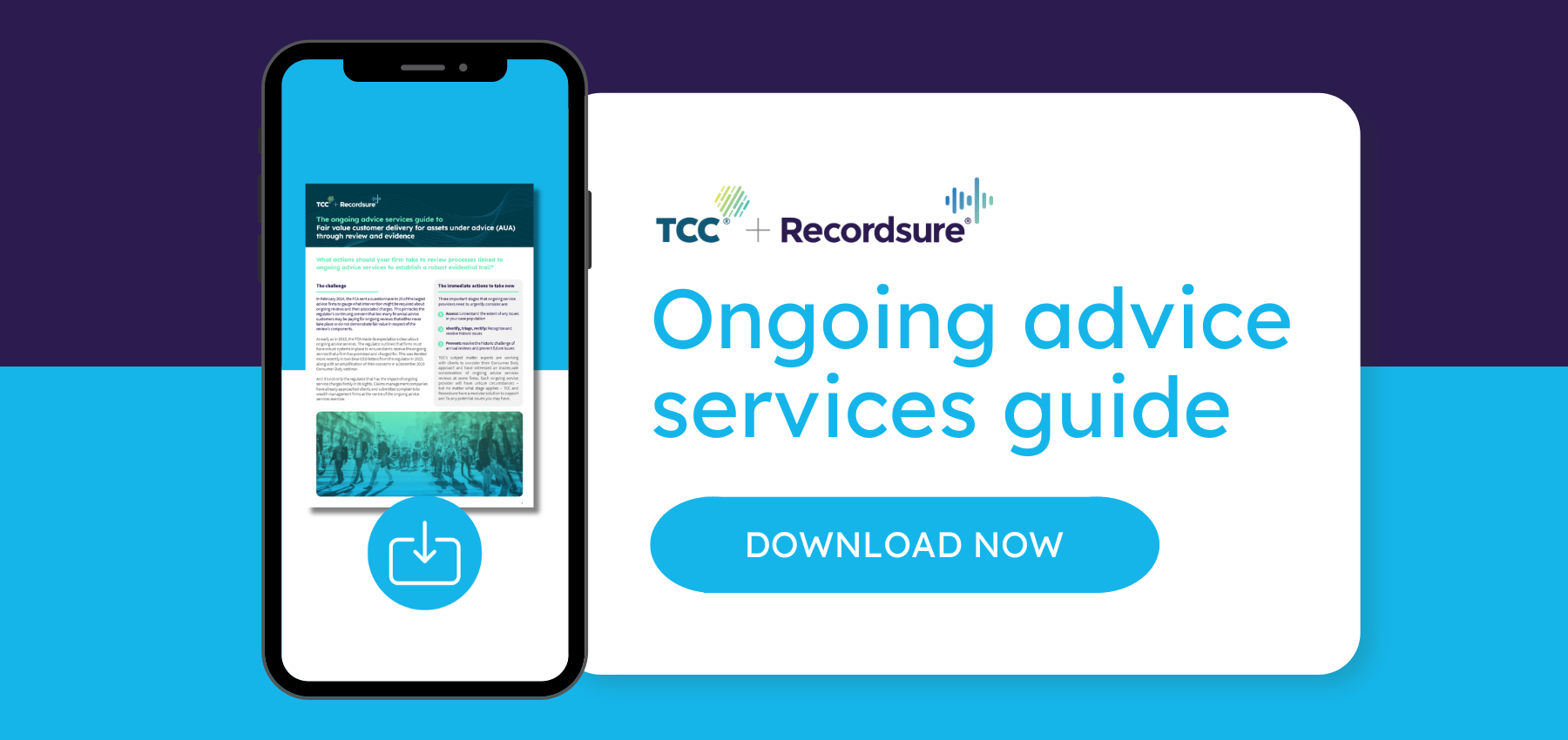For over a year, ongoing service charges – and the associated quality of service provided by financial advice and wealth management firms – have been high on the FCA’s agenda.
On 15th February, the regulator issued an information request survey to a number of financial advice and wealth management firms, further demonstrating its heightened interest in ongoing service charges practices. This survey included questions on the number of full periodic reviews completed versus not completed and the number of clients who were issued refunds of ongoing servicing fees.
The latest FCA action sends a very clear message that firms need an evidenced advice review to act as justification for charging their ongoing service fees – rather than the commonplace process of charging fees automatically, delinked from the actual service.
Since its implementation date almost nine months ago, the new Consumer Duty has been the benchmark for industry standards – and the FCA is now keen to understand how firms have ‘assessed their ongoing services… and whether they have made any change as a result’ regarding the Duty.
Claims management companies have also recognised this as a ‘low-hanging fruit’ opportunity and are heavily targeting social media to identify customers of major wealth management firms to represent them to ‘get their fees back and any consequential compensation they are due’.
With this in mind, it’s fair to say that the matter of ongoing advice services is not going away – and firms need to act now to ensure they are not the next targets.
Harnessing the power of AI
The FCA regularly refers to itself as a data-led regulator and has acknowledged its aim to train employees to maximise the opportunities that artificial intelligence (AI) can bring.
Jessica Rusu, Chief Data, Information and Intelligence Officer at the FCA, said: “We know AI has the potential to transform financial services. It offers benefits ranging from enhanced customer experiences and better consumer outcomes, faster fraud detection, and a financial landscape that adapts and evolves faster than ever before.”
We know AI has the potential to transform financial services. It offers benefits ranging from enhanced customer experiences and better consumer outcomes, faster fraud detection, and a financial landscape that adapts and evolves faster than ever before.
Jessica Rusu, Chief Data, Information and Intelligence Officer, FCA
But given the challenges that ongoing service providers face, how can firms use the power of AI to demonstrate Consumer Duty compliance?
Our three-pronged, AI-driven approach can help firms understand the extent of any issues in their back book, rectify identified historic problems and prevent any ongoing future fee risks.
Three step approach
1. Understand the extent of any issues in your ongoing advice services population with an AI-powered health check
By combining the power of smart people and smart tech, Recordsure can provide an in-depth evaluation of 1,000 of your client cases with an AI-powered health check.
Recordsure’s wealth management-trained ReviewAI solution extracts a random sample of client cases from your PMS.
Our trusted compliance advisory partner, TCC, will then review a sample of cases to confirm the size of the problem and investigate the root cause (e.g. failure to attempt contact, unable to agree a time, refusal of service, review complete but not documented properly etc.) followed by the compilation of a summary report, which can be used to determine next steps and supplied as evidence to the regulator if required.
2. Identify and resolve historic issues with an AI-powered triage of your complete provision
When firms know what they want to achieve with their active and closed cases, they can link their entire book to Recordsure’s secure AI-powered CaseReviewAI product – and triage their whole ongoing advice services population.
This clear analysis offers actionable insights into the clients who have either missed whole service periods or have had perfunctory reviews that would not justify the charge for an ongoing service – in turn paving the way to begin suitable rectification such as refunding of unjustified fees.
Through our partnership with TCC, we’re also able to deliver expert compliance advice on what to do and how to do it, provide specialist resources for you to manage the rectification and/or complaint processes, or offer a full outsource service to manage the rectification/complaint processes on your behalf.
3. Address the persistent challenge of annual reviews and prevent future issues
Dealing with historic missing and perfunctory reviews will move you out of the crosshairs of the CMCs, who will target the low-hanging fruit organisations who aren’t proactively fixing the historic problem. However, the FCA will still want evidence that clients will be receiving ongoing advice if they’re paying for it.
The solution to this problem is having a series of controls, linked to your PMS, capable of identifying any clients who haven’t received the service they are paying for – enabling firms to either deliver that service or stop the fees.
CaseReviewAI can:
- Ingest all new documentation loaded onto the PMS
- Assess cases on the anniversary of previous advice to determine whether there’s sufficient documentation to justify the charging of ongoing service fees
- Flag within the PMS system when an annual review is missing or incomplete, so that compliance leads can easily report on, and resolve, missed or perfunctory reviews before they become a problem
And where a detailed review of the case is required, CaseReviewAI will take a lot of the legwork away, enabling suitability reviews to be done 50% faster when compared to human review alone.






